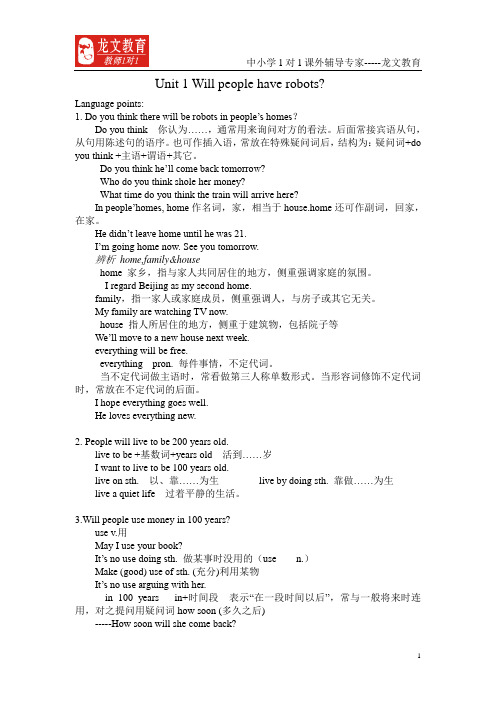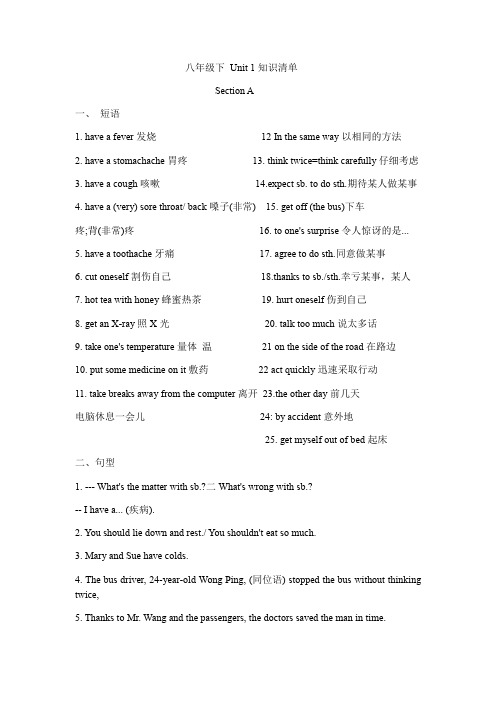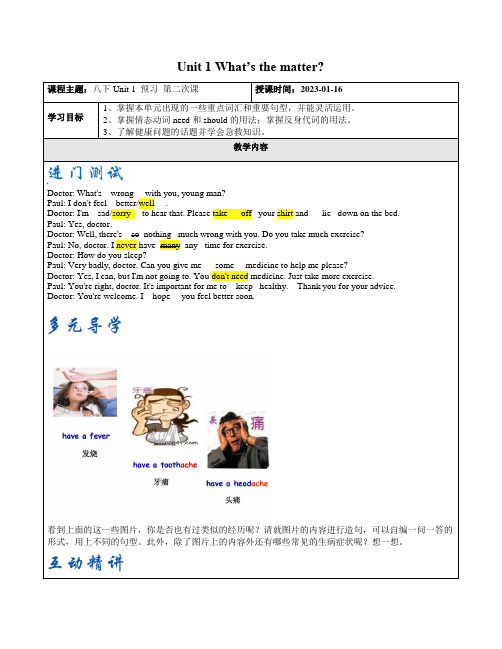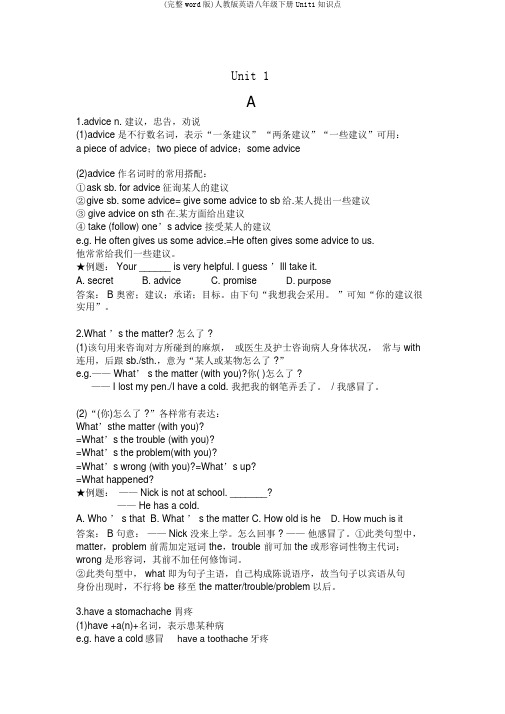人教版八年级下册英语Unit1知识点练习及答案上课讲义
最全面人教版八年级下册英语第一单元知识点归纳总结

Unit 1 What's the matter?一、词汇与短语◆重点单词A部分1.matter n. 问题;事情2.sore adj. 疼痛的;酸痛的3.stomachache n. 胃痛;腹痛4.foot n. 脚;足5.neck n. 颈;脖子6.stomach n. 胃;腹部7.throat n. 咽喉;喉咙8.hurt v. (使)疼痛;受伤9.fever n. 发烧10.passenger n. 乘客;旅客11.lie v. 躺;平躺12.break n. 间歇;休息13.rest v. &n. 放松;休息14.onto prep. 向;朝15.X-ray n. X射线;X光16.trouble n. 问题;苦恼17.toothache n. 牙痛18.hit n. (用手或器具)击;打19.headache n. 头痛20.herself pron. (she的反身代词)她自己21.off adv. & prep. 离开(某处);不工作;从……去掉B部分1.bandage n. 绷带v. 用绷带包扎2.press v. 压;挤;按3.sick adj. 生病的;有病的4.knee n. 膝;膝盖5.breathe v. 呼吸6.knife n. 刀7.sunburned adj. 晒伤的8.blood n. 血9.ourselves pron. (we反身代词)我们自己10.mean v. 意思是;打算11.climber n. 登山者;攀登者12.importance n. 重要性;重要13.risk n.&v. 危险;风险;冒险14.decision n. 决定;抉择15.accident n.(交通)事故;意外遭遇16.control v.&n. 限制;约束;管理17.situation n. 情况;状况18.spirit n. 勇气;意志19.kilo( = kilogram) n. 千克;公斤20.death n. 死;死亡21.rock n. 岩石22.nurse n. 护士◆重点短语A部分1.have a cold 感冒2.lie down 躺下3.have a stomachache 胃痛4.take one's temperature 量体温5.have a fever 发烧6.to one's surprise 使……惊讶的是7.get off 下车8.right away 立即;马上9.take breaks (take a break) 休息10.talk too much 说得太多11.drink enough water 喝足够的水12.have a very sore throat 嗓子非常疼13.get an X-ray 拍X光片14.see a dentist 看牙医15.drink some hot tea with honey 喝一些加蜂蜜的热茶16.put some medicine on sth.在……上面敷一些药17.feel very hot 感到很热18.sound like 听起来像19.all weekend 整个周末20.in the same way 以同样的方式21.go to a doctor 看医生22.go along 沿着……走23.on the side of the road 在马路边24.shout for help 大声呼救25.without thinking twice 没有多想26.have a heart problem 有心脏病27.thanks to 多亏了;由于28.in time 及时29.save a life 挽救生命30.get into trouble 陷入麻烦31.hurt oneself 受伤32.fall down落下;摔倒B部分1.be used to 习惯于……;适应于……2.in a difficult situation 在困境中3.take risks (take a risk) 冒险4.keep on doing sth. 继续(或坚持)做某事5.run out (of) 用尽;耗尽6.make a decision 作出决定7.cut off 切除8.get hit on the head 撞到头部9.get out of 离开;从……岀来10.be interested in 对……感兴趣11.give up 放弃12.mean doing sth. 意味着做某事13.put a bandage on sth. 用绷带包扎…14.lose one's life 失去生命15.feel sick 感到恶心16.mountain climbing 登山运动17.have problems breathing 呼吸困难18.be in control of 掌管;管理◆重点句子A部分1.What's the matter with you?=What's the trouble with you?=What's wrong with you?你怎么了?2.What should she do? 她该怎么办呢?3.Did you fall down? 你跌倒了吗?4.Should I take my temperature? 我应该量一下体温吗?5.I think I sat in the same way for too long without moving.我想我以同样的姿势一动不动地坐得太久了。
人教版八年级下册Unit 1知识点及练习

Unit 1 Will people have robots?Language points:1. Do you think there will be robots in people‘s homes?Do you think 你认为……,通常用来询问对方的看法。
后面常接宾语从句,从句用陈述句的语序。
也可作插入语,常放在特殊疑问词后,结构为:疑问词+do you think +主语+谓语+其它。
Do you think he‘ll come back tomorrow?Who do you think shole her money?What time do you think the train will arrive here?In people‘homes, home作名词,家,相当于house.home还可作副词,回家,在家。
He didn‘t leave home until he was 21.I‘m going h ome now. See you tomorrow.辨析home,family&househome 家乡,指与家人共同居住的地方,侧重强调家庭的氛围。
I regard Beijing as my second home.family,指一家人或家庭成员,侧重强调人,与房子或其它无关。
My family are watching TV now.house 指人所居住的地方,侧重于建筑物,包括院子等We‘ll move to a new house next week.everything will be free.everything pron. 每件事情,不定代词。
当不定代词做主语时,常看做第三人称单数形式。
当形容词修饰不定代词时,常放在不定代词的后面。
I hope everything goes well.He loves everything new.2. People will live to be 200 years old.live to be +基数词+years old 活到……岁I want to live to be 100 years old.live on sth. 以、靠……为生live by doing sth. 靠做……为生live a quiet life 过着平静的生活。
人教版八年级英语下册Unit 1知识点

人教版八年级英语下册Unit 1知识点人教版八年级英语下册Unit 1知识点Unit 1 Will people have robots?重点语法:一般将来时态的应用do/does 的一般将来时态形式:(shall/will) dodo/does 的一般将来时态的被动语态:(shall/will)be done一般将来时态的肯定句、否定句、疑问句形式:肯定句例句:People will have robots in a few years.否定句例句:People (will not/won't) have robots in a few years.一般疑问句例句:Will people have robots in a few years?特殊疑问句例句:What will people have in a few years?重点短语:won't = will notthey'llwillshe'll = she willhe'll = he willI'll = I willfall in love with(sb./sth.)爱上(某人/某物)be able to do sth. 能够做某事come true 实现uture 未来hundreds of 数以百计的thousands of 数以千计的look for(sb./sth.)寻找(某人/某物)will → would 情态动词 will 的原形和过去式may → might 情态动词 may 的原形和过去式Reading Strategy(阅读方法)Look ale and picture, and predict what you will read about. (看着标题和图片,预知你要阅读那些方面的内容。
)This helps you get ready to acquire new information. (这样可以帮助你获得一些新的信息。
人教版八年级英语下册Unit1知识点讲练

人教版八年级英语下册Unit1知识点Unti1 What’s the matter?Section A page 11、What’s wrong with you ? 你怎么了同义句有:What’s the ma tter/ trouble/ problem with you? (matter/ trouble/ problem 是名词,前用the ;wrong 是形容词,前不用the )题:What’s the boy?(A. the wrong with B. the matter at C. the trouble with)2、have a cold=catch a cold患感冒;have a cough 患咳嗽;have a fever 发烧;have a stomachache 胃疼;have a headache 头痛have a sore throat 喉咙疼have sore eyes眼疼I have a headache. = I have an ache in my head. (ache 指持续的疼痛,pain 指肉体上的剧烈疼痛,sore常指发炎而引起的肌肉痛)3、(1) too much 表“太多”修饰不可数名词,还可以用来修饰动词,如:①too much money; ②Stay in bed and don’t move your leg too much.(2) too many 表“太多”修饰可数名词复数,如:too many students(3) much too表“非常地”修饰形容词或副词,如:much too expensive题:①You shouldn’t drink water.②Don’t eat , or you’ll be fat.4、enough 的用法:(1)enough(足够的/地) 修饰形容词或副词必须放在它的后面。
如:big enough (大的足够)slowly enough (慢地足够) enough 修饰名词时,即可放其前,也可放其后。
人教版八年级下Unit1知识点总结和习题(含部分答案)

八年级下Unit 1知识清单Section A一、短语1. have a fever发烧12 In the same way以相同的方法2. have a stomachache胃疼13. think twice=think carefully仔细考虑3. have a cough咳嗽14.expect sb. to do sth.期待某人做某事4. have a (very) sore throat/ back嗓子(非常) 15. get off (the bus)下车疼;背(非常)疼16. to one's surprise令人惊讶的是...5. have a toothache牙痛17. agree to do sth.同意做某事6. cut oneself割伤自己18.thanks to sb./sth.幸亏某事,某人7. hot tea with honey蜂蜜热茶19. hurt oneself伤到自己8. get an X-ray照X光20. talk too much说太多话9. take one's temperature量体温21 on the side of the road在路边10. put some medicine on it敷药22 act quickly迅速采取行动11. take breaks away from the computer离开23.the other day前几天电脑休息一会儿24: by accident意外地25. get myself out of bed起床二、句型1. --- What's the matter with sb.?二What's wrong with sb.?-- I have a... (疾病).2. You should lie down and rest./ You shouldn't eat so much.3. Mary and Sue have colds.4. The bus driver, 24-year-old Wong Ping, (同位语) stopped the bus without thinking twice,5. Thanks to Mr. Wang and the passengers, the doctors saved the man in time.三、知识点讲解一、疾病、事故的表达1. have a部位+不空格+ache have a toothache2. have a sore+空格+部位have a sore throat3. have a+名词( fever/ cold/ cancer)have a pain in/on 十部位4.部位+hurt My neck hurts.5.动词词组: cut oneself ; hurt oneself; fall down from; fall off二、He expected most or all the passengers to get off and wait for another bus.下车+大型,敞开的交通工具get off the bus; get off the bike; get off the trainI am new here. Could you please tell me where I should get off?When I saw the crying baby, I got off the bike and asked him why.注: 反义: get on ....get out of...下车+空间狭小的交通工具The rich lady got out of the car with her pretty dog without looking at anybody.注:反义: get into ...三、He expected most or all the passengers to get off and wait for another bus.expect的用法Vt.期待期待做某事expect to do sth. = look forward to doing sth.He expected to hear from Mary.期待某事expect sth.These American businessmen are expecting a cooperation from us.Little Tony really expected a full agreement from his father that he could join thearmy.期待某人做某事expect sb. to do sth.I expect my sister to come back early so that we can go to Avril's concert together.expect+从句They are in trouble, but I expect that they can deal with it themselves.四、Thanks to Mr. Wang and the passengers, the doctors saved the man in time.thanks to幸亏,由于+好的结果= because of +好/不好的事情We don't need to take the P.E. exam, thanks to the heavy rain.He saved the city thanks to his brilliance and his goodwill.他用他的智慧与仁政拯万民于水火。
Unit1What’sthematter辅导讲义2人教版八年级英语下册

Unit 1 What’s the matter?Doctor: What's__wrong__ with you, young man?Paul: I don't feel__better/well__ .Doctor: I'm__sad/sorry__ to hear that. Please take___off_ your shirt and___lie_ down on the bed.Paul: Yes, doctor.Doctor: Well, there's__so_nothing_ much wrong with you. Do you take much exercise?Paul: No, doctor. I never have_many_any_ time for exercise.Doctor: How do you sleep?Paul: Very badly, doctor. Can you give me___some__ medicine to help me please?Doctor: Yes, I can, but I'm not going to. You don't need medicine. Just take more exercise.Paul: You're right, doctor. It's important for me to__keep_ healthy. Thank you for your advice.Doctor: You're welcome. I__hope__ you feel better soon.看到上面的这一些图片,你是否也有过类似的经历呢?请就图片的内容进行造句,可以自编一问一答的形式,用上不同的句型。
此外,除了图片上的内容外还有哪些常见的生病症状呢?想一想。
人教版八年级下册英语Unit1知识点(K12教育文档)

人教版八年级下册英语Unit1知识点(word版可编辑修改)编辑整理:尊敬的读者朋友们:这里是精品文档编辑中心,本文档内容是由我和我的同事精心编辑整理后发布的,发布之前我们对文中内容进行仔细校对,但是难免会有疏漏的地方,但是任然希望(人教版八年级下册英语Unit1知识点(word版可编辑修改))的内容能够给您的工作和学习带来便利。
同时也真诚的希望收到您的建议和反馈,这将是我们进步的源泉,前进的动力。
本文可编辑可修改,如果觉得对您有帮助请收藏以便随时查阅,最后祝您生活愉快业绩进步,以下为人教版八年级下册英语Unit1知识点(word版可编辑修改)的全部内容。
Unit1 What's the matter? 名词:matter 问题;事情stomachache 胃痛;腹痛stomach 胃;腹部foot 脚;足neck 颈;脖子throat 咽喉;喉咙fever 发烧X—ray X射线;X光toothache 牙痛headache 头痛break 间歇;休息passenger 乘客;旅客trouble 问题;苦恼knee 膝盖climber 登山者;攀登者situation 情况;状况kilo(=kilometer)千克;公斤rock 岩石knife 刀blood 血importance 重要性;重要decision 决定;抉择spirit 勇气;意志death 死亡nurse 护士动词:lie 躺;平躺hurt (使)疼痛;受伤hit (用手或器具)击;打mean 意思是;打算;意欲形容词:sick 生病的;有病的sore 疼痛的;酸痛的代词:herself 她自己ourselves 我们自己介词:onto 向;朝兼类词:rest v&n 放松;休息cough n&v 咳嗽risk n&v 危险;风险;冒险control n&v 限制;约束;管理off adv&prep 离开(某处);不工作;从…去掉短语:have a cold 感冒have a stomachache 胃痛have a fever 发烧lie down 躺下take one’s temperature 量体温take breaks=take a break 休息get off 下车get on 上车to one’s surprise 使……惊讶的是right away 立即;马上get into 陷入;参与take risks=take a risk 冒险run out(of)用尽;耗尽cut off 切除get out of 离开;从……出来be in control of 掌握;管理give up 放弃be used to doing sth 习惯于…;适应于…used to do sth 过去常常做某事知识点:1、What's the matter?怎么了?What's the matter with sb?某人怎么了?询问某人或周围发生了什么事情=What’s wrong?=What's the trouble/problem?例:—What's the matter?—I have a cold。
(完整word版)人教版英语八年级下册Unit1知识点

Unit 1A1.advice n. 建议,忠告,劝说(1)advice 是不行数名词,表示“一条建议”“两条建议”“一些建议”可用:a piece of advice;two piece of advice;some advice(2)advice 作名词时的常用搭配:①ask sb. for advice征询某人的建议②give sb. some advice= give some advice to sb给.某人提出一些建议③ give advice on sth在.某方面给出建议④ take (follow) one’s advice 接受某人的建议e.g. He often gives us some advice.=He often gives some advice to us.他常常给我们一些建议。
★例题: Your ______ is very helpful. I guess ’Ill take it.A. secretB. adviceC. promiseD. purpose答案: B 奥密;建议;承诺;目标。
由下句“我想我会采用。
”可知“你的建议很实用”。
2.What ’s the matter? 怎么了 ?(1)该句用来咨询对方所碰到的麻烦,或医生及护士咨询病人身体状况,常与 with 连用,后跟 sb./sth.,意为“某人或某物怎么了 ?”e.g.—— What’ s the matter (with you)?你( )怎么了 ?—— I lost my pen./I have a cold. 我把我的钢笔弄丢了。
/ 我感冒了。
(2)“(你)怎么了 ?”各样常有表达:What’sthe matter (with you)?=What’s the trouble (with you)?=What’s the problem(with you)?=What’s wrong (with you)?=What’s up?=What happened?★例题:—— Nick is not at school. _______?—— He has a cold.A. Who ’ s thatB. What ’ s the matterC. How old is heD. How much is it答案: B 句意:—— Nick 没来上学。
- 1、下载文档前请自行甄别文档内容的完整性,平台不提供额外的编辑、内容补充、找答案等附加服务。
- 2、"仅部分预览"的文档,不可在线预览部分如存在完整性等问题,可反馈申请退款(可完整预览的文档不适用该条件!)。
- 3、如文档侵犯您的权益,请联系客服反馈,我们会尽快为您处理(人工客服工作时间:9:00-18:30)。
人教版八年级下册英语U n i t1知识点练习
及答案
人教版八年级下册英语Unit1知识点练习及答案 Section A
I. 根据括号中的汉语提示写单词,完成句子。
1. I didn’t go to school yesterday, because I had a bad ______(感冒).
2. My _____(背部) is a little sore.
3. Please open your ________(嘴).
4. There is a ring around the dog’s ________(脖子).
5. I need to ______(休息) for an hour.
6. My father went to Shanghai three days ______(以前).
II. 用括号中所给单词的适当形式填空。
1. My little son has eight _______ (tooth).
2. Good living habits can keep you away from many _____(ill).
3. My pen pal gave me some good ______(advice) on studying English.
4. This animal’s ______(foot) are so small.
5. You shouldn’t ______(watch) TV for too long. It is not good for your _____(eye).
III. 根据汉语意思完成句子,每空一词。
1. 请站起来,不要躺下。
Please stand up and don’t _____ ____.
2. 那听起来是个不错的主意。
That ____ ____ a good idea.
3. 她妈妈要她上床睡觉。
Her mother asks her to ______ _______ ______.
4. 我希望你很快好起来。
I hope you _______ ______ ______.
5. 他每天都喝很多水。
He drinks ______ ______ water every day.
6. 当你胃痛的时候,你不应该吃任何东西。
When you _____ _____ _____, you ______ eat anything.
IV. 从方框中选择与各句相对应的答语。
( )1. What’s the matter with him?
( )2. Do you have a fever?
( )3. I have a toothache.
( )4. When did it start raining?
( )5. You shouldn’t drink so much coffee.
A. You should see a dentist.
B. I think you are right.
C. He has a headache.
D. No, I don’t.
E. At 9 o’clock.
Section B
I. 选择与各问题相对应的建议。
( )1. tired
( )2. hungry
( )3. thirsty
( )4. weak
( )5. stressed out
A. eat some bread
B. listen to music
C. do more exercise
D. go to bed early
E. drink some juice
II. 从方框中选择适当的词或短语填空。
much; many
1. My father bought ______ chocolates for me.
2. How _____ meat do you need?
little; few
3. —I want some honey. Do you have any?
—I’m sorry. We have ______ of it.
4. There are _____ students in the classroom. Most of them are playing outside.
a little; a few
5. You can put ______ honey in the milk.
6. Our teacher taught us _____ new words yesterday.
III. 从方框中选择合适的单词,并用其适当形式填空。
way, moment, important, western, angry, everybody, until, traditional
1. _______ should follow the rules in our school.
2. My father was ______ wi th me because I didn’t pass the exam.
3. He has a lot of work to do at the _______. He has no time to rest.
4. There are many differences between Chinese culture and ______ culture.
5. Dumplings are one of the _____ foods in China. People usually eat them on festivals.
6. Practicing hard is the best _____ to learn English.
7. Good eating habits is _____ for you to keep healthy.
8. He worked very late last night.
He didn’t come back home _____ 12 o’clock.
IV. 连词成句。
1. have, you, do, throat, sore, a (?)
__________________________
2. shouldn’t, too, medicine, you, much, take (.)
__________________________
3. with, the, what’s, Sally, matter (?)
__________________________
4. to, it, think, do, well, is, anything, I, difficult (.)
__________________________
5. have, what, they, problems, do (?)
__________________________
6. balanced, all, need, healthy, a, diet, stay, we, to (.)
__________________________
参考答案
Section A
I. 1. cold 2. back 3. mouth 4. neck 5. rest 6. ago
II. 1. teeth 2. illnesses 3. advice 4. feet 5. watch; eyes
III. 1. lie down 2. sounds like 3. go to bed 4. feel better soon
5. lots of
6. have a stomachache; shouldn’t
IV. 1-5 CDAEB
Section B
I. 1-5 DAECB
II. 1. many 2. much 3. little 4. few 5. a little 6. a few III. 1. Everybody 2. angry 3. moment 4. western
5. traditional
6. way
7. important
8. until
IV. 1. Do you have a sore throat?
2. You shouldn’t take too much medicine.
3. What’s the matter with Sally?
4. I think it is difficult to do anything well.
5. What problems do they have?
6. We all need a balanced diet to stay healthy.。
